Sociology Assignment: Colonisation and First Nations Australians
VerifiedAdded on 2022/09/14
|5
|1374
|32
Essay
AI Summary
This essay examines the detrimental impact of invasion and colonisation on First Nations Australians, drawing inspiration from Roxane Gay's perspective on social justice. It analyzes the historical consequences, including population decline due to disease, land acquisition, and violent conflict. The essay highlights the ongoing disparities in education, employment, and mortality rates, emphasizing the need for social workers to move beyond mere allyship and actively address systemic oppression. The author reflects on personal experiences of unintentional participation in oppression and advocates for social workers to challenge colonizing mentalities, promote equal opportunities, and actively campaign against discrimination. The essay underscores the importance of understanding the struggles of First Nations Australians and working towards decolonisation in daily practice.
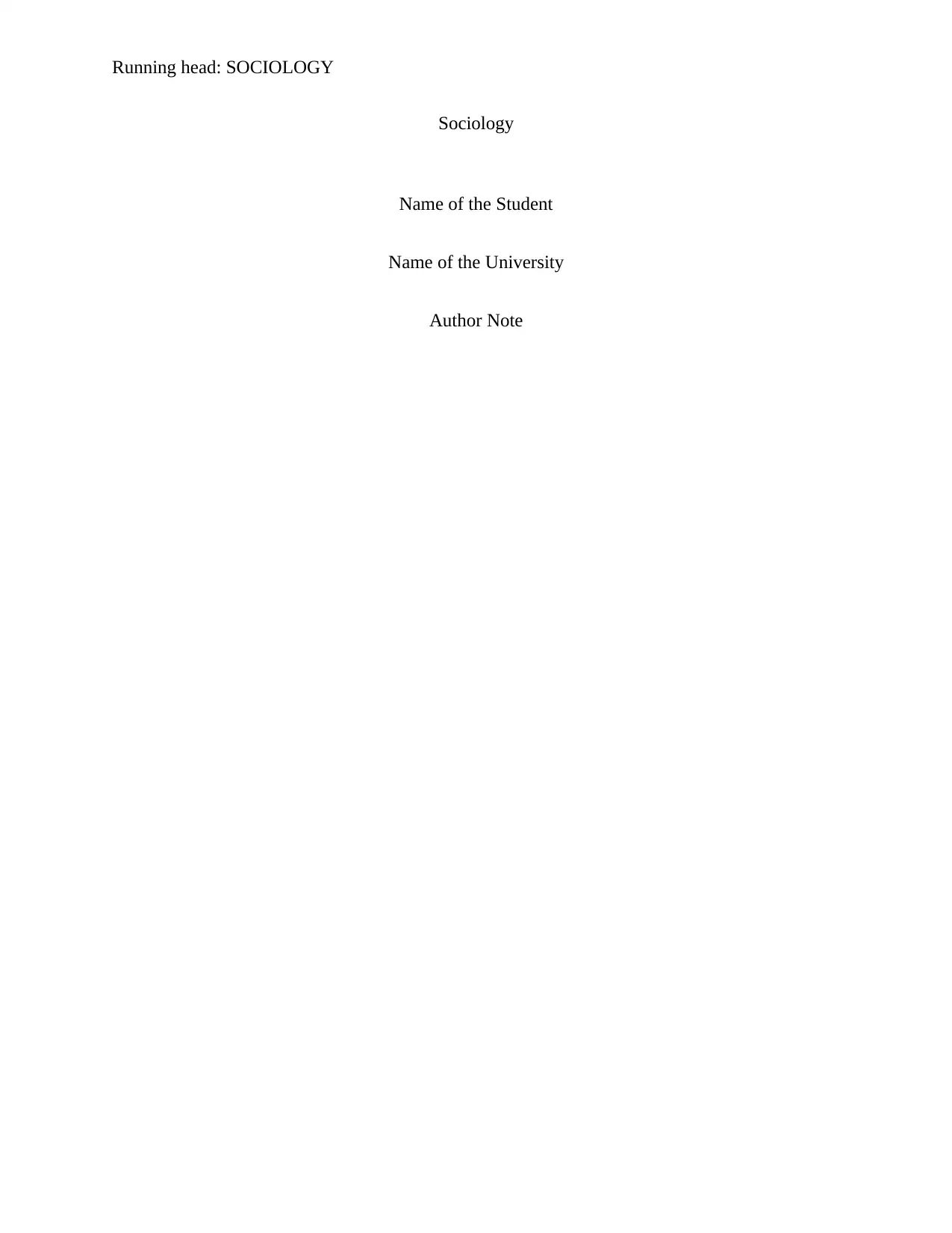
Running head: SOCIOLOGY
Sociology
Name of the Student
Name of the University
Author Note
Sociology
Name of the Student
Name of the University
Author Note
Paraphrase This Document
Need a fresh take? Get an instant paraphrase of this document with our AI Paraphraser
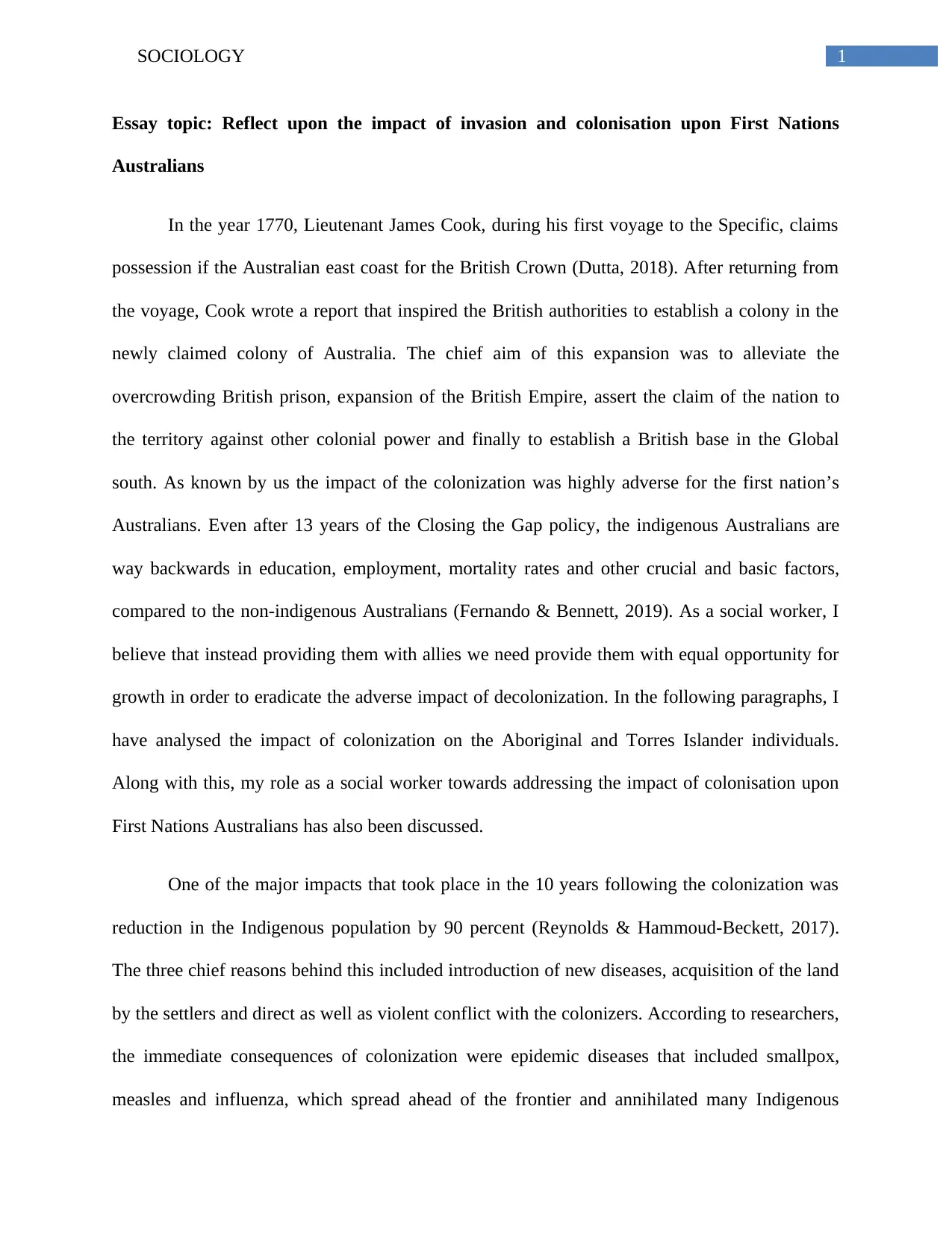
1SOCIOLOGY
Essay topic: Reflect upon the impact of invasion and colonisation upon First Nations
Australians
In the year 1770, Lieutenant James Cook, during his first voyage to the Specific, claims
possession if the Australian east coast for the British Crown (Dutta, 2018). After returning from
the voyage, Cook wrote a report that inspired the British authorities to establish a colony in the
newly claimed colony of Australia. The chief aim of this expansion was to alleviate the
overcrowding British prison, expansion of the British Empire, assert the claim of the nation to
the territory against other colonial power and finally to establish a British base in the Global
south. As known by us the impact of the colonization was highly adverse for the first nation’s
Australians. Even after 13 years of the Closing the Gap policy, the indigenous Australians are
way backwards in education, employment, mortality rates and other crucial and basic factors,
compared to the non-indigenous Australians (Fernando & Bennett, 2019). As a social worker, I
believe that instead providing them with allies we need provide them with equal opportunity for
growth in order to eradicate the adverse impact of decolonization. In the following paragraphs, I
have analysed the impact of colonization on the Aboriginal and Torres Islander individuals.
Along with this, my role as a social worker towards addressing the impact of colonisation upon
First Nations Australians has also been discussed.
One of the major impacts that took place in the 10 years following the colonization was
reduction in the Indigenous population by 90 percent (Reynolds & Hammoud-Beckett, 2017).
The three chief reasons behind this included introduction of new diseases, acquisition of the land
by the settlers and direct as well as violent conflict with the colonizers. According to researchers,
the immediate consequences of colonization were epidemic diseases that included smallpox,
measles and influenza, which spread ahead of the frontier and annihilated many Indigenous
Essay topic: Reflect upon the impact of invasion and colonisation upon First Nations
Australians
In the year 1770, Lieutenant James Cook, during his first voyage to the Specific, claims
possession if the Australian east coast for the British Crown (Dutta, 2018). After returning from
the voyage, Cook wrote a report that inspired the British authorities to establish a colony in the
newly claimed colony of Australia. The chief aim of this expansion was to alleviate the
overcrowding British prison, expansion of the British Empire, assert the claim of the nation to
the territory against other colonial power and finally to establish a British base in the Global
south. As known by us the impact of the colonization was highly adverse for the first nation’s
Australians. Even after 13 years of the Closing the Gap policy, the indigenous Australians are
way backwards in education, employment, mortality rates and other crucial and basic factors,
compared to the non-indigenous Australians (Fernando & Bennett, 2019). As a social worker, I
believe that instead providing them with allies we need provide them with equal opportunity for
growth in order to eradicate the adverse impact of decolonization. In the following paragraphs, I
have analysed the impact of colonization on the Aboriginal and Torres Islander individuals.
Along with this, my role as a social worker towards addressing the impact of colonisation upon
First Nations Australians has also been discussed.
One of the major impacts that took place in the 10 years following the colonization was
reduction in the Indigenous population by 90 percent (Reynolds & Hammoud-Beckett, 2017).
The three chief reasons behind this included introduction of new diseases, acquisition of the land
by the settlers and direct as well as violent conflict with the colonizers. According to researchers,
the immediate consequences of colonization were epidemic diseases that included smallpox,
measles and influenza, which spread ahead of the frontier and annihilated many Indigenous
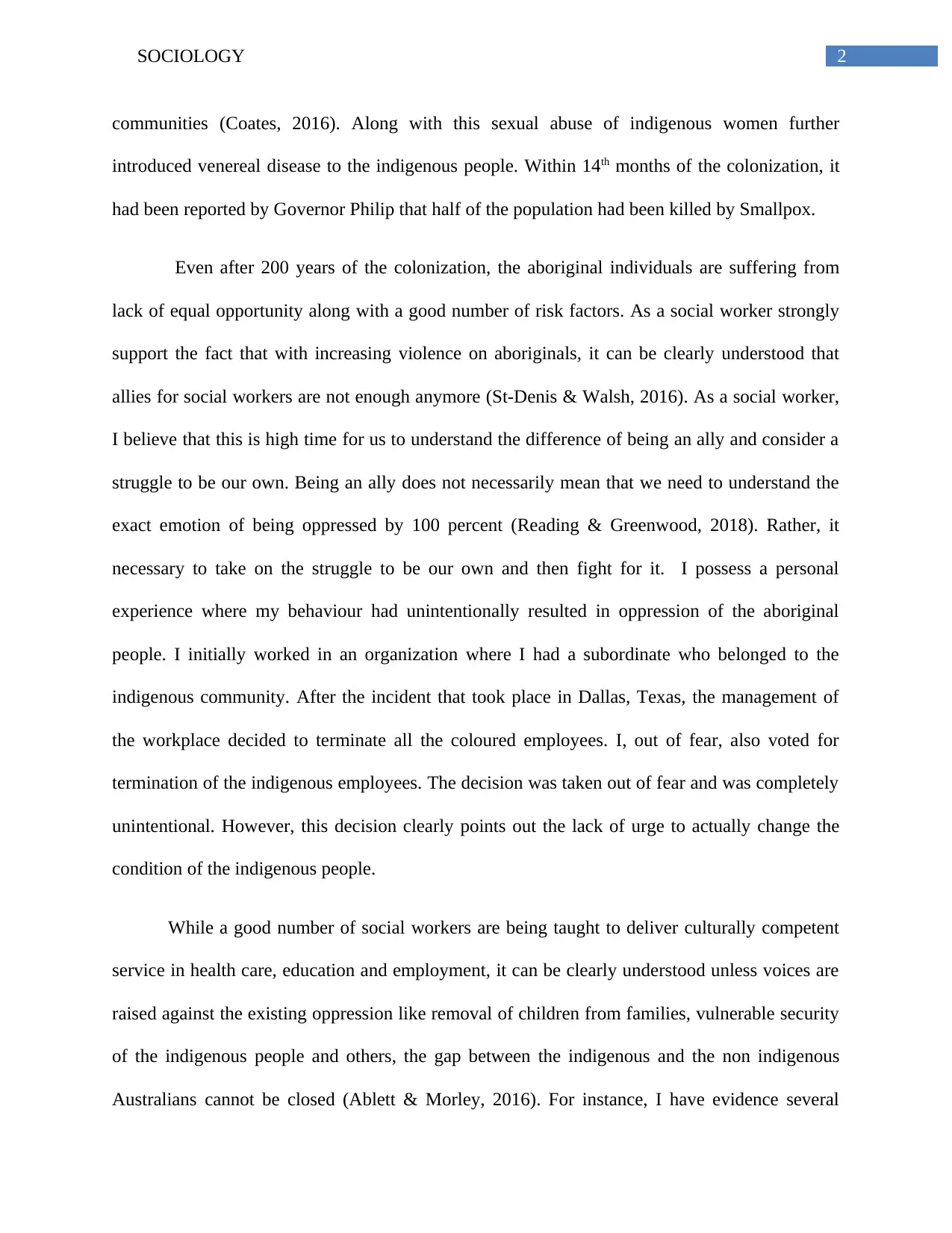
2SOCIOLOGY
communities (Coates, 2016). Along with this sexual abuse of indigenous women further
introduced venereal disease to the indigenous people. Within 14th months of the colonization, it
had been reported by Governor Philip that half of the population had been killed by Smallpox.
Even after 200 years of the colonization, the aboriginal individuals are suffering from
lack of equal opportunity along with a good number of risk factors. As a social worker strongly
support the fact that with increasing violence on aboriginals, it can be clearly understood that
allies for social workers are not enough anymore (St-Denis & Walsh, 2016). As a social worker,
I believe that this is high time for us to understand the difference of being an ally and consider a
struggle to be our own. Being an ally does not necessarily mean that we need to understand the
exact emotion of being oppressed by 100 percent (Reading & Greenwood, 2018). Rather, it
necessary to take on the struggle to be our own and then fight for it. I possess a personal
experience where my behaviour had unintentionally resulted in oppression of the aboriginal
people. I initially worked in an organization where I had a subordinate who belonged to the
indigenous community. After the incident that took place in Dallas, Texas, the management of
the workplace decided to terminate all the coloured employees. I, out of fear, also voted for
termination of the indigenous employees. The decision was taken out of fear and was completely
unintentional. However, this decision clearly points out the lack of urge to actually change the
condition of the indigenous people.
While a good number of social workers are being taught to deliver culturally competent
service in health care, education and employment, it can be clearly understood unless voices are
raised against the existing oppression like removal of children from families, vulnerable security
of the indigenous people and others, the gap between the indigenous and the non indigenous
Australians cannot be closed (Ablett & Morley, 2016). For instance, I have evidence several
communities (Coates, 2016). Along with this sexual abuse of indigenous women further
introduced venereal disease to the indigenous people. Within 14th months of the colonization, it
had been reported by Governor Philip that half of the population had been killed by Smallpox.
Even after 200 years of the colonization, the aboriginal individuals are suffering from
lack of equal opportunity along with a good number of risk factors. As a social worker strongly
support the fact that with increasing violence on aboriginals, it can be clearly understood that
allies for social workers are not enough anymore (St-Denis & Walsh, 2016). As a social worker,
I believe that this is high time for us to understand the difference of being an ally and consider a
struggle to be our own. Being an ally does not necessarily mean that we need to understand the
exact emotion of being oppressed by 100 percent (Reading & Greenwood, 2018). Rather, it
necessary to take on the struggle to be our own and then fight for it. I possess a personal
experience where my behaviour had unintentionally resulted in oppression of the aboriginal
people. I initially worked in an organization where I had a subordinate who belonged to the
indigenous community. After the incident that took place in Dallas, Texas, the management of
the workplace decided to terminate all the coloured employees. I, out of fear, also voted for
termination of the indigenous employees. The decision was taken out of fear and was completely
unintentional. However, this decision clearly points out the lack of urge to actually change the
condition of the indigenous people.
While a good number of social workers are being taught to deliver culturally competent
service in health care, education and employment, it can be clearly understood unless voices are
raised against the existing oppression like removal of children from families, vulnerable security
of the indigenous people and others, the gap between the indigenous and the non indigenous
Australians cannot be closed (Ablett & Morley, 2016). For instance, I have evidence several
⊘ This is a preview!⊘
Do you want full access?
Subscribe today to unlock all pages.

Trusted by 1+ million students worldwide
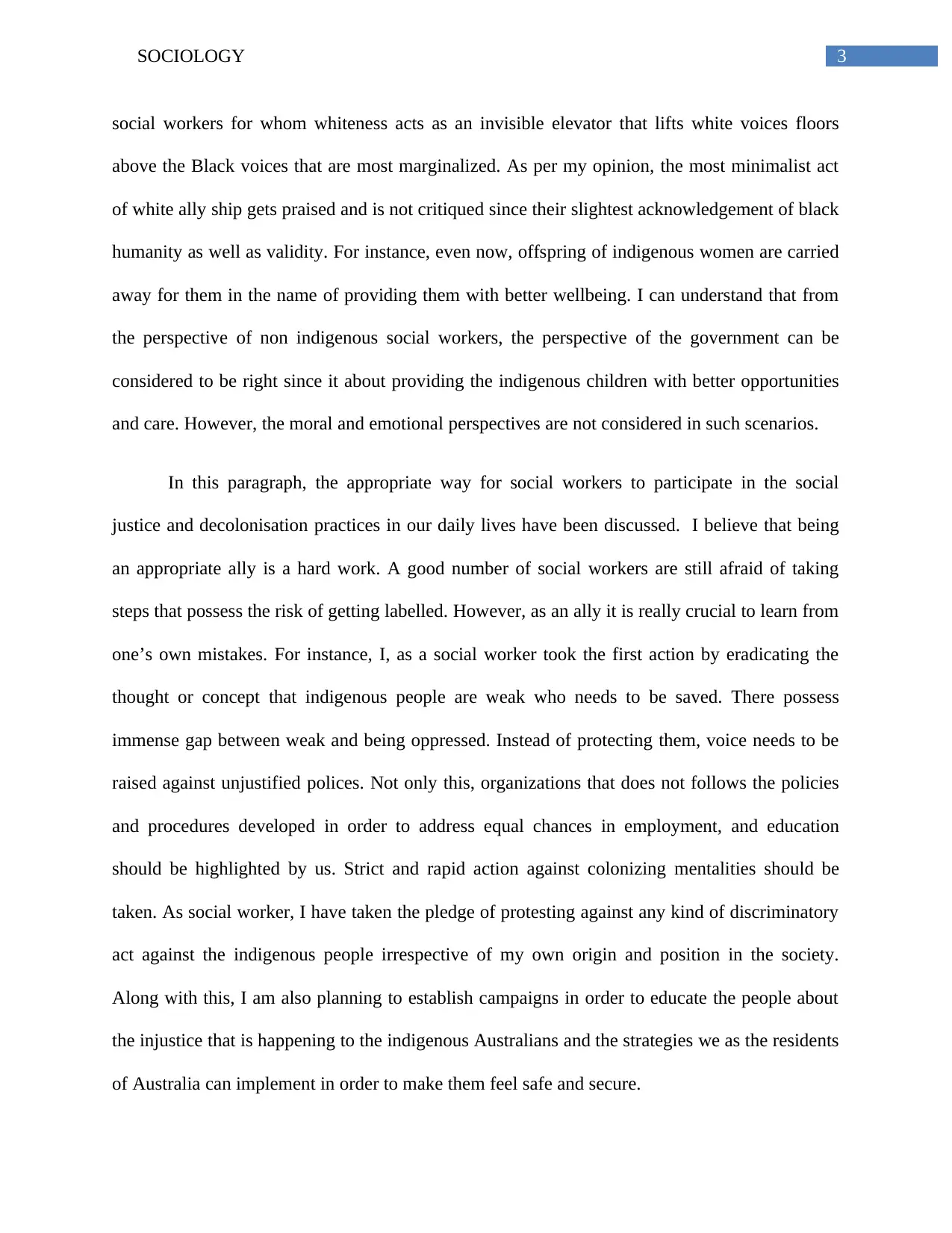
3SOCIOLOGY
social workers for whom whiteness acts as an invisible elevator that lifts white voices floors
above the Black voices that are most marginalized. As per my opinion, the most minimalist act
of white ally ship gets praised and is not critiqued since their slightest acknowledgement of black
humanity as well as validity. For instance, even now, offspring of indigenous women are carried
away for them in the name of providing them with better wellbeing. I can understand that from
the perspective of non indigenous social workers, the perspective of the government can be
considered to be right since it about providing the indigenous children with better opportunities
and care. However, the moral and emotional perspectives are not considered in such scenarios.
In this paragraph, the appropriate way for social workers to participate in the social
justice and decolonisation practices in our daily lives have been discussed. I believe that being
an appropriate ally is a hard work. A good number of social workers are still afraid of taking
steps that possess the risk of getting labelled. However, as an ally it is really crucial to learn from
one’s own mistakes. For instance, I, as a social worker took the first action by eradicating the
thought or concept that indigenous people are weak who needs to be saved. There possess
immense gap between weak and being oppressed. Instead of protecting them, voice needs to be
raised against unjustified polices. Not only this, organizations that does not follows the policies
and procedures developed in order to address equal chances in employment, and education
should be highlighted by us. Strict and rapid action against colonizing mentalities should be
taken. As social worker, I have taken the pledge of protesting against any kind of discriminatory
act against the indigenous people irrespective of my own origin and position in the society.
Along with this, I am also planning to establish campaigns in order to educate the people about
the injustice that is happening to the indigenous Australians and the strategies we as the residents
of Australia can implement in order to make them feel safe and secure.
social workers for whom whiteness acts as an invisible elevator that lifts white voices floors
above the Black voices that are most marginalized. As per my opinion, the most minimalist act
of white ally ship gets praised and is not critiqued since their slightest acknowledgement of black
humanity as well as validity. For instance, even now, offspring of indigenous women are carried
away for them in the name of providing them with better wellbeing. I can understand that from
the perspective of non indigenous social workers, the perspective of the government can be
considered to be right since it about providing the indigenous children with better opportunities
and care. However, the moral and emotional perspectives are not considered in such scenarios.
In this paragraph, the appropriate way for social workers to participate in the social
justice and decolonisation practices in our daily lives have been discussed. I believe that being
an appropriate ally is a hard work. A good number of social workers are still afraid of taking
steps that possess the risk of getting labelled. However, as an ally it is really crucial to learn from
one’s own mistakes. For instance, I, as a social worker took the first action by eradicating the
thought or concept that indigenous people are weak who needs to be saved. There possess
immense gap between weak and being oppressed. Instead of protecting them, voice needs to be
raised against unjustified polices. Not only this, organizations that does not follows the policies
and procedures developed in order to address equal chances in employment, and education
should be highlighted by us. Strict and rapid action against colonizing mentalities should be
taken. As social worker, I have taken the pledge of protesting against any kind of discriminatory
act against the indigenous people irrespective of my own origin and position in the society.
Along with this, I am also planning to establish campaigns in order to educate the people about
the injustice that is happening to the indigenous Australians and the strategies we as the residents
of Australia can implement in order to make them feel safe and secure.
Paraphrase This Document
Need a fresh take? Get an instant paraphrase of this document with our AI Paraphraser
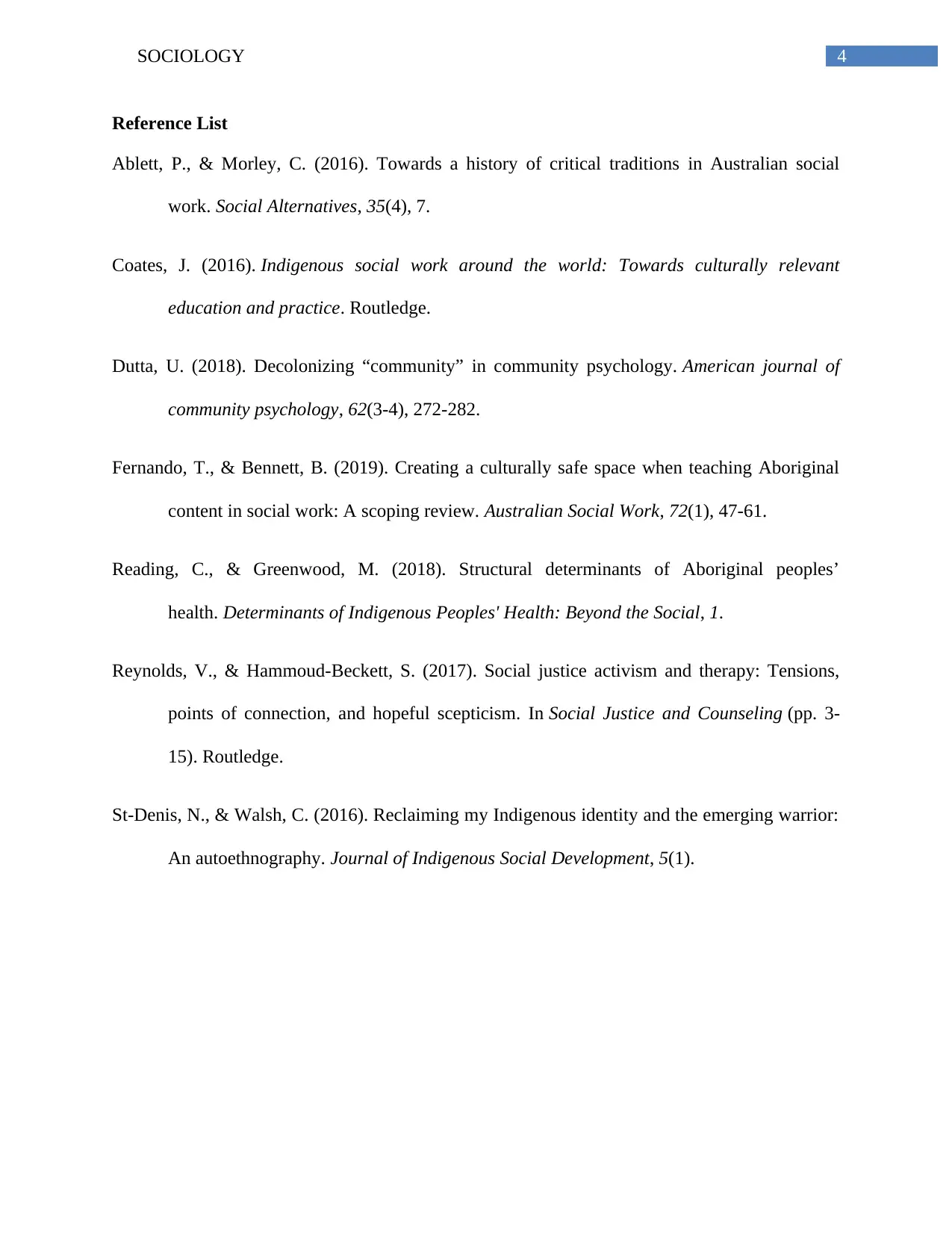
4SOCIOLOGY
Reference List
Ablett, P., & Morley, C. (2016). Towards a history of critical traditions in Australian social
work. Social Alternatives, 35(4), 7.
Coates, J. (2016). Indigenous social work around the world: Towards culturally relevant
education and practice. Routledge.
Dutta, U. (2018). Decolonizing “community” in community psychology. American journal of
community psychology, 62(3-4), 272-282.
Fernando, T., & Bennett, B. (2019). Creating a culturally safe space when teaching Aboriginal
content in social work: A scoping review. Australian Social Work, 72(1), 47-61.
Reading, C., & Greenwood, M. (2018). Structural determinants of Aboriginal peoples’
health. Determinants of Indigenous Peoples' Health: Beyond the Social, 1.
Reynolds, V., & Hammoud-Beckett, S. (2017). Social justice activism and therapy: Tensions,
points of connection, and hopeful scepticism. In Social Justice and Counseling (pp. 3-
15). Routledge.
St-Denis, N., & Walsh, C. (2016). Reclaiming my Indigenous identity and the emerging warrior:
An autoethnography. Journal of Indigenous Social Development, 5(1).
Reference List
Ablett, P., & Morley, C. (2016). Towards a history of critical traditions in Australian social
work. Social Alternatives, 35(4), 7.
Coates, J. (2016). Indigenous social work around the world: Towards culturally relevant
education and practice. Routledge.
Dutta, U. (2018). Decolonizing “community” in community psychology. American journal of
community psychology, 62(3-4), 272-282.
Fernando, T., & Bennett, B. (2019). Creating a culturally safe space when teaching Aboriginal
content in social work: A scoping review. Australian Social Work, 72(1), 47-61.
Reading, C., & Greenwood, M. (2018). Structural determinants of Aboriginal peoples’
health. Determinants of Indigenous Peoples' Health: Beyond the Social, 1.
Reynolds, V., & Hammoud-Beckett, S. (2017). Social justice activism and therapy: Tensions,
points of connection, and hopeful scepticism. In Social Justice and Counseling (pp. 3-
15). Routledge.
St-Denis, N., & Walsh, C. (2016). Reclaiming my Indigenous identity and the emerging warrior:
An autoethnography. Journal of Indigenous Social Development, 5(1).
1 out of 5
Related Documents
Your All-in-One AI-Powered Toolkit for Academic Success.
+13062052269
info@desklib.com
Available 24*7 on WhatsApp / Email
![[object Object]](/_next/static/media/star-bottom.7253800d.svg)
Unlock your academic potential
Copyright © 2020–2026 A2Z Services. All Rights Reserved. Developed and managed by ZUCOL.





